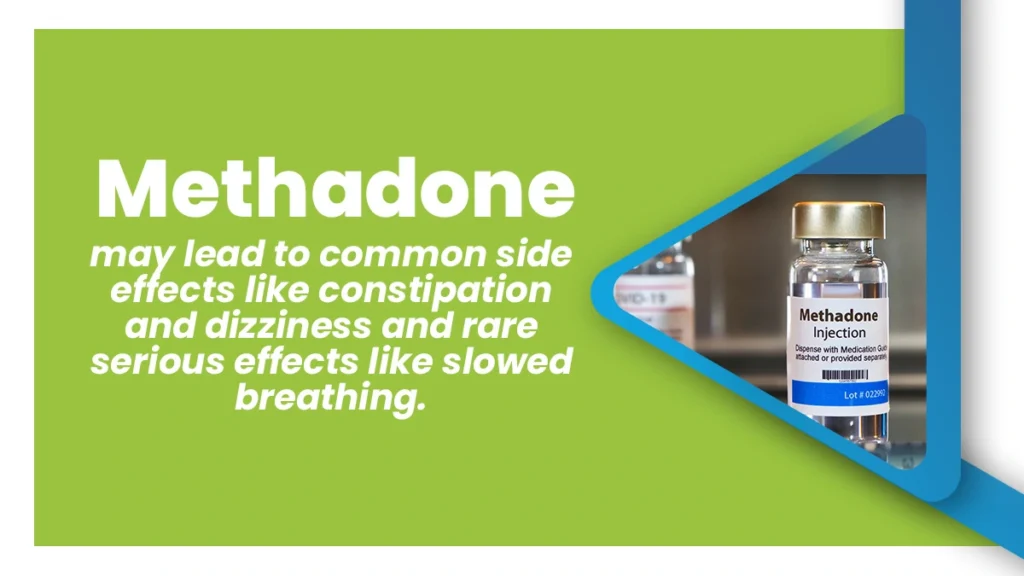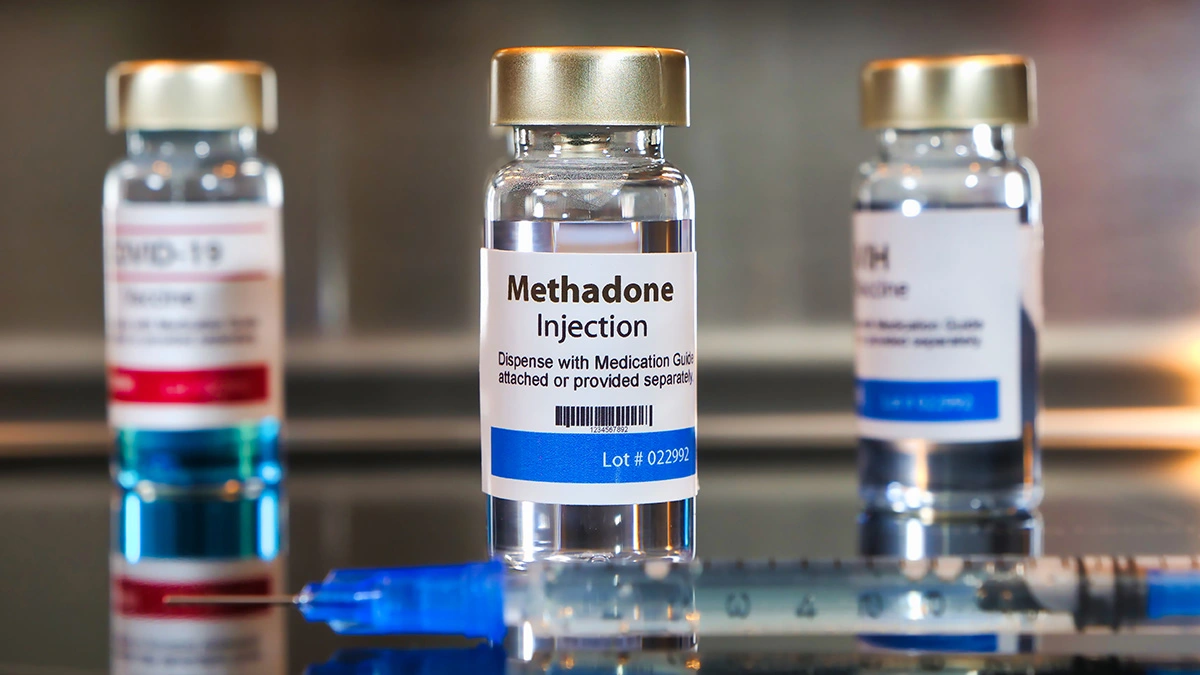Methadone is a medication used in treating opioid addiction and managing severe pain. It works by altering how the brain and nervous system respond to pain and reducing the withdrawal symptoms associated with opioid dependence.
Doctors prescribe methadone as part of a comprehensive treatment plan to help individuals overcome addiction to illegal drugs like heroin or prescription painkillers. Its long-lasting effects make it valuable in easing cravings and stabilizing patients undergoing recovery.
Continue reading as we look into the effects of methadone treatment, emphasizing its effectiveness in aiding addiction recovery and pain management. In addition, we will also explore potential side effects and health risks associated with methadone use.
Key Takeaways
Methadone, a prescription drug for managing opioid use disorder (OUD) and chronic pain, has its potential benefits and risks. Here is what this article entails:
- Methadone aids in managing opioid dependence and offers relief for chronic pain under medical supervision.
- Methadone may lead to common side effects like constipation and dizziness and rare serious effects like slowed breathing.
- The use of methadone for a longer time may impact physical health and mental well-being, varying among individuals.
- Methadone overdose can be life-threatening, showing signs like respiratory depression or extreme drowsiness.
- Withdrawal from methadone may bring about symptoms like muscle aches, nausea, and anxiety, varying in intensity.
Begin your journey to freedom from methadone’s grip with The Haven Detox-Little Rock. Contact us at (501) 271-3342 for more information.
Methadone: An Overview
Methadone is a synthetic opioid medication primarily used in pain management and the treatment of opioid addiction, particularly for people undergoing medication-assisted treatment (MAT) programs. Methadone is a long-acting opioid, meaning that its effects can last for an extended period compared to shorter-acting opioids.
Medical Uses of Methadone
- Pain Management: It’s used for chronic pain relief, especially when other opioids might not be as effective or suitable due to tolerance or other reasons.
- Opioid Addiction Treatment: Methadone is also utilized in MAT programs to help individuals recovering from opioid addiction. It reduces opioid withdrawal symptoms and cravings, enabling individuals to function without the intense highs and lows associated with other opioids.
- Methadone Maintenance Therapy: In addiction treatment, it’s often used as a long-term maintenance therapy, allowing individuals to stabilize their lives while reducing the desire for other opioids.
Methadone works by binding to the same opioid receptors in the brain as other opioids, but its effects develop more slowly and last longer. This helps in managing withdrawal symptoms and cravings without causing the extreme euphoria associated with drugs like heroin or morphine. However, it still carries a risk of dependence and addiction if not used as prescribed.
It’s important to use methadone under strict medical supervision due to its potential for abuse, dependence, and risk of overdose. Improper use or combining it with other substances, especially alcohol or sedatives, can be dangerous and even life-threatening.
Stabilizing Lives: Benefits of Methadone Treatment
Methadone, a medication in the opioid family, serves multiple purposes in healthcare. Here, we will explore the two primary positive effects of methadone treatment: its role in managing opioid dependency and its effectiveness in pain management.
Opioid Dependence
When individuals are struggling with addiction to opioids like heroin or prescription painkillers, methadone can act as a stabilizer. It works by binding to the same receptors in the brain as opioids, but its effects are slower and milder.
This slow and long-acting action helps in reducing cravings without providing the intense high associated with other opioids. As a result, individuals under supervised methadone treatment can regain stability in their lives, allowing them to focus on rehabilitation and gradually taper off their dependence on more potent opioids.
Pain Management
Beyond its role in the treatment of addiction, methadone is also utilized for chronic pain management. Its unique properties provide relief for individuals experiencing severe or long-lasting pain. Unlike shorter-acting opioids, methadone’s extended duration of action allows for consistent pain control with fewer frequent doses.
In addition, it may be a viable option for those who have developed a tolerance to other pain medications. However, it’s crucial to note that using methadone for pain management requires close monitoring by healthcare professionals due to its potency and the potential for overdose.
Methadone’s Side Effects
While methadone can be beneficial in treating opioid use disorder (OUD) and managing pain, it’s essential to understand the possible side effects it may bring. These effects can vary from common but manageable to rare yet serious occurrences.
Common Side Effects
Like many medications, methadone can cause some common side effects. These can include constipation, drowsiness, dry mouth, and nausea. These effects often occur at the beginning of treatment and might diminish as the body adjusts to the medication.
Proper hydration, dietary adjustments, and following the prescribed dosage of methadone can help mitigate these unwanted side effects. Communicating discomfort or concerns to a healthcare provider to ensure appropriate support during treatment is essential.
Rare or Serious Side Effects
While uncommon, methadone can also lead to more severe side effects that require immediate medical intervention. These include shallow or slowed breathing, chest pain, irregular heartbeat, hallucinations, or severe dizziness.
Additionally, the allergic reaction to methadone can manifest as rashes, itching, swelling, or difficulty breathing. While these serious side effects are less common, it’s crucial to seek medical attention if any of these symptoms occur, as they can indicate potentially life-threatening situations.

Methadone’s Impact on Overall Health
Understanding the long-term effects of methadone use is crucial for individuals undergoing treatment. While it can be beneficial in managing opioid dependence and chronic pain, use for a long period may also have effects on both physical and mental health that warrant consideration.
Effects on Physical Health
Long-term use of methadone can have implications for physical health. Some individuals may experience weight gain or changes in hormonal levels, which could lead to conditions like decreased sex drive or irregular menstrual cycles.
Additionally, extended use of methadone might affect bone density, potentially increasing the risk of fractures. Regular health check-ups and discussions with healthcare providers are essential to monitor and address any physical health concerns that may arise during long-term methadone treatment.
Effects on Mental Health
In terms of mental health, long-term methadone use may impact mood and cognitive function in some individuals. While it can stabilize mood swings associated with opioid abuse and addiction, it may also lead to feelings of anxiety or depression for some.
Moreover, cognitive effects such as difficulty concentrating or memory issues might surface in a subset of individuals. Monitoring mental health and discussing any changes with treatment providers can help address these concerns and explore potential adjustments to treatment plans.
Risks of Methadone Overdose
While methadone can be beneficial, taking too much can lead to an overdose, which requires immediate medical attention. Understanding the signs and proper response to a methadone overdose is vital for anyone using this medication.
Signs of Methadone Overdose
Overdose can occur when methadone is taken in higher amounts than prescribed or when combined with other substances, such as alcohol or sedatives. Recognizing the signs of a methadone overdose is vital for prompt intervention.
Symptoms may include extreme drowsiness, difficulty breathing, pinpoint pupils, muscle weakness, clammy skin, confusion, or loss of consciousness. If someone exhibits these signs and there’s a possibility of methadone overdose, seeking immediate medical help is crucial. Being aware of these indicators can potentially save a life in emergencies.
Treatment for Methadone Overdose
Prompt action is essential in treating a methadone overdose. Calling emergency services, such as 911, is the first step. While waiting for medical assistance, if the person is conscious and breathing, keeping them awake and upright can help. Do not give anything to eat or drink unless directed by emergency responders.
In cases of severe overdose where breathing is compromised or the person is unconscious, administering naloxone, an opioid overdose reversal medication approved by the United States Food and Drug Administration (FDA), can be life-saving. Proper training in administering naloxone is crucial, and it’s recommended for friends and family of individuals taking methadone to have access to this medication in case of an emergency.
Navigating Methadone Withdrawal: Symptoms and Support
When stopping methadone use suddenly or reducing the dosage too quickly, withdrawal symptoms can occur. Recognizing these symptoms and knowing the available treatments is vital for a smoother transition and better management of the withdrawal process.
Symptoms of Methadone Withdrawal
Withdrawal from methadone can present with various symptoms, including muscle aches, nausea, vomiting, diarrhea, runny nose, sweating, anxiety, and insomnia. These symptoms can be distressing but are typically not life-threatening.
These symptoms often begin within 24-36 hours after the last methadone dose and peak around the third day, gradually improving over the following weeks. However, individual experiences with withdrawal can differ, with some people experiencing milder symptoms while others may have a more challenging time.
Treatment for Methadone Withdrawal
Managing methadone withdrawal involves a combination of medical and psychological support. Gradual tapering of methadone under the guidance of a healthcare professional can help minimize withdrawal symptoms. Medications may be prescribed to alleviate specific symptoms, such as anti-nausea medicines or sleep aids.
Additionally, mental health support, including counseling and therapy, is also integral to addressing the emotional aspects of withdrawal and providing coping strategies. Engaging in a supportive community, such as 12-step programs or group therapy, can further enhance the recovery process.
Recognizing the Signs: Knowing When To Seek Help
Seeking help for methadone addiction is crucial when you notice signs of dependence or when your use of methadone begins to impact your life negatively. Here are some indicators that it might be time to seek help:
- Increased Tolerance: Needing higher doses of methadone to achieve the same effects indicates developing tolerance, which can lead to addiction.
- Withdrawal Symptoms: Experiencing withdrawal symptoms when not using methadone, such as nausea, sweating, anxiety, or insomnia, suggests physical dependence.
- Difficulty Controlling Use: If you find it challenging to control or reduce your methadone use despite wanting to, it could signify addiction.
- Health Issues: Physical or mental health problems arising from methadone use should prompt immediate action.
- Persistent Cravings: Intense cravings for methadone that interfere with daily life indicate drug abuse that requires professional help.
- Failed Attempts to Quit: If you’ve tried to stop using methadone on your own but haven’t been successful, seeking professional assistance is advisable.
Remember that addiction is a medical problem, and seeking help is a proactive and positive step toward recovery. If you’re unsure whether you or someone you know has a methadone addiction, consulting with a healthcare professional can provide valuable guidance.
Frequently Asked Questions (FAQ)
Methadone affects the body by binding to opioid receptors in the brain, easing pain and reducing opiate withdrawal symptoms without causing the same intense highs as other opioids.
Methadone can affect mood for some people. It may lead to mood swings or changes, but not everyone experiences this effect similarly.
The duration people stay on methadone varies. Some may use it short-term for pain, while others, managing opioid addiction, might stay on methadone for an extended period as part of a treatment program.
Methadone side effects may include constipation, dizziness, drowsiness, nausea, and rare serious effects like respiratory depression or heart rhythm problems.
The Haven Detox-Little Rock: Committed to Recovery
Looking for a way to break free from substance abuse? The Haven Detox-Little Rock can help you achieve just that. Our medical detox program is designed to give you the best start towards a healthier life. We assist your body in transitioning without the use of drugs, minimizing any withdrawal symptoms you may experience.
Our residential treatment program offers 24/7 medical care, ensuring you receive the utmost support, therapy, and attention to smoothly transition into a renewed and healthy life.It is time to take the first step. Contact us at (501) 271-3342 today your healing journey awaits.




